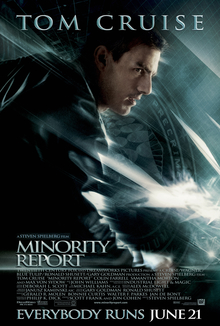The movie Minority Report was recently playing on TV and I was reminded of one of the most chilling scenes in this futuristic, dystopian movie. I am referring to the short scene where Tom Cruise's character is walking down a street and through a commercial area and is bombarded with advertising messages directed specifically to him.
 I found myself very disturbed by this scene of direct marketing on steroids on many levels. On the plot level, Cruise's character is trying to sneak away unnoticed. Having billboards and holograms shouting his name, trying to sell him things, was preventing that. On a societal level, I could not help but think how strange it would be if society became accustomed to that level of personalized and targeted intrusion, noise and hubbub. On a marketing level, I have to admit I was disturbed by my eager thoughts of all the different things you could do if you could literally target marketing messages to the individual at the point of sale, or at any point in the decision making process you wanted.
I found myself very disturbed by this scene of direct marketing on steroids on many levels. On the plot level, Cruise's character is trying to sneak away unnoticed. Having billboards and holograms shouting his name, trying to sell him things, was preventing that. On a societal level, I could not help but think how strange it would be if society became accustomed to that level of personalized and targeted intrusion, noise and hubbub. On a marketing level, I have to admit I was disturbed by my eager thoughts of all the different things you could do if you could literally target marketing messages to the individual at the point of sale, or at any point in the decision making process you wanted.The reason I am writing about a science fiction movie is that advances in data management and data mining technology are making the fiction in Minority Report closer and closer to fact. While not currently using eye scan technology (that I know of), we are capable of greater and greater specificity in our marketing messages. We are capable of faster and faster matching of consumer's actions and behaviors to the messages that we send them. We can combine and divide customer and prospect data faster and cheaper than ever before. It is safe to say that marketers have the ability to know more about their customers likes and dislikes, demographics and psychographics, purchase and shopping habits, and everything in between, than ever before.
But to quote another movie that was released the same year as Minority Report, "...with great power, comes great responsibility."
Marketers and businesses must tred carefully when mining data for marketing messages. As we have seen recently, people will respond negatively and sometimes strongly when they feel that their privacy is being violated, especially for commercial reasons. Internet companies and their advertisers have seen some push back from consumers and the media when they are perceived to have reached too far in mining individual information and personalizing marketing messages.
While the temptations to use new and powerful capabilities, I suspect that used recklessly that the benefits will be short-lived at best.
The good news is that the solution of how to employ new and emerging technology without alienating customers and prospects is very easy. It is also very basic. All you have to do is ask permission.
As we learned in kindergarten, saying please and thank you goes a long way. That is still true in marketing and especially true when you are pushing the boundaries on your customers' comfort levels. By asking permission, you can mitigate a whole slew of potentially negative reactions. It doesn't happen any more, but there was a time when people who got direct marketing letters in their homes that were personally addressed to them and had personal information in the letter would freak out. People were upset and felt they were being spied on. Strong reactions also greeted internet companies like Facebook when they changed privacy rules to allow more sharing of data with paying marketers.
Asking permission has a couple of significant benefits. First, your prospect is not surprised by your personalized marketing appeal. That minimizes the negative reactions and increases receptivity. Second, by asking permission, you are pre-qualifying a prospect. You know that this person has a certain level of interest. This makes them a less risky marketing investment. More tools and more data can be focus on those who have given permission. Finally, the very act of asking permission projects a positive image. A company that cares enough to ask before they plunge into full force marketing shows that they care about customers.
That is a huge advantage! And it seems much less intrusive.

No comments:
Post a Comment